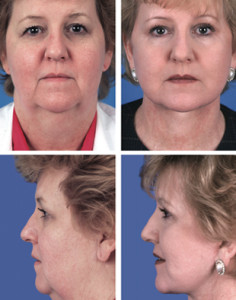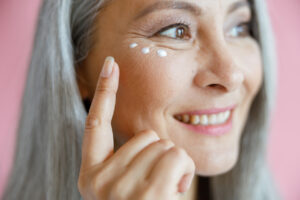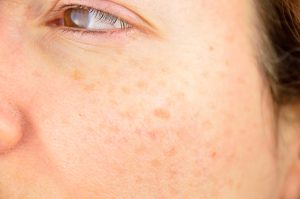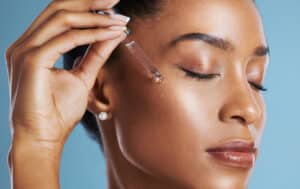Rod Rohrich, M.D. and Mary Crosland
D: Congratulations on your new book, Navigate Your Beauty-Smart and Safe Plastic Surgery Solutions. What a great idea to provide potential plastic surgery patients with this kind of powerful tool. Dr. Rohrich is the Chair of the University of Texas SW Department of Plastic Surgery and as an internationally renowned plastic surgeon. Practicing in the Dallas area, your services and opinions are frequently sought after. Ms. Crosland, at the same time, offers a new point of view as an experienced business woman and as a sophisticated consumer of rejuvenation procedures. Both of your points of view are helpful and sorely lacking as you look around to see what is available in the way of practical advice for people seriously considering surgery to look more youthful.
Dr. Rohrich’s Three Magic Questions
Early in the book, you teach the reader to ask “The Three Magic Questions” in order to find the right plastic surgeon. You both emphasize safety over all else. Additionally, you stress undertaking prudent precautions to insure the best possible aesthetic outcome. That is where “The Three Magic Questions” come in. The point of asking them is to determine the experience level of the surgeon, the expertise of the doctor who will be operating on you, and finally, does this doctor get exceptional results? For our reader’s edification, here are “The Three Magic Questions:”
- Is the procedure that you want done one of the top three surgeries that this surgeon performs, and how often does he or she do it?
- Does the surgeon teach, speak or write about this procedure for the benefit of other plastic surgeons?
- Does the surgeon have long term follow-up photos for this procedure?
Q. I know that you say any surgeon worth their salt shouldn’t be put off by these Three Magic Questions. Are young doctors today taught to expect inquiries like these? Are they taught to handle them with aplomb?
Dr. Rohrich: Yes, they are superbly trained to handle these situations and they are on their way to becoming accredited plastic surgeons and are eligible to be boarded by the American Board of Plastic Surgery.
Q. Ms. Crosland, when you have asked one or all of these questions…have the prospective surgeons handled the situation gracefully?
Ms. Crosland: If a prospective surgeon feels aggravated, put out, or annoyed with any part of answering what we refer to as the 3 Magic Questions, this would be a major red flag for the patient. As a patient advocate, I feel it is the patient who needs to know and understand all the information and be able to know they are going to be safe from harm for any procedure and have the best outcome. If a prospective surgeon cannot answer gracefully, go elsewhere. As a patient you must have rapport with your prospective surgeon…
Dr. Rohrich 5 Keys to Good Skin Care
 D: I appreciated that both of you urged the reader to never be intimidated by lavish offices or the number of certificates or accreditations on the wall. You remind the reader that they do not have to audition for the role of patient.
D: I appreciated that both of you urged the reader to never be intimidated by lavish offices or the number of certificates or accreditations on the wall. You remind the reader that they do not have to audition for the role of patient.
In Chapter 4, you talk about looking great without plastic surgery. Specifically, you detail the 5 Keys to Good Skin Care, and you mention “medical grade” skin care products.
Most of us have probably been using cosmetic grade skin care regimes most our lives and don’t understand the difference. Probably cost is not a great indicator of whether a product is cosmetic or medical grade. I know that I have paid several hundred dollars for a jar of face cream in a high-end department store. Now fear it was probably a cosmetic grade product.
Q. Could one of you tell us what “medical grade skin care products” are and where you buy them?
Ms. Crosland: Medical grade skin care products are higher in active ingredients than over the counter items and are overseen by a physician. Medical grade products work in deeper layers of the skin to help repair not just the epidermis or outer layer. Also, they are published in medical journals and are proven to work, especially those with Retin A.
Q. Could one of you list some of the brand names of these “medical grade skin care products” for us?
Dr. Rohrich: There are several great medical grade skin care companies that really put science into their skin care products. This list is not exclusive so I will mention only a few including: Obagi, ZO Skin Care, Mary Kay, Eraclea, Clinique, Skinceuticals and LaRoche-Posay. The key element is one that has an effective ingredient such retinal or a salacyclic acid compound that really goes deeper into the layers of the skin and makes a difference long term if used properly.
Navigating the Future of Beauty
D: The horror stories that you both lay out for the readers in your book are truly shocking and go a long way in explaining your combined motivation for writing Navigate Your Beauty. More than anything, you must want to save other people from the pain and disfigurement that you have witnessed.
Q. We have all seen bad face lifts, but I’m wondering if sometimes people aren’t just too brave about being seen in public too soon after their surgery. Could that be the case with faces that seem lopsided or eyes that seem to be pulled way too tightly? Or am I just being optimistic here?
Dr. Rohrich: No, these people will never look good and will often require corrective surgery to improve their appearance.
Q. What does the future hold in store for plastic surgery? Are there any exciting new developments that you can share with us?
Dr. Rohrich: The future of plastic surgery is bright. We will see more non and minimally invasive techniques and technology in the near future to replace many of the invasive procedures we do now like tummy tucks and facelifts! Stay tuned!
D: Thank you both for your time and Prime Women wishes you every success with this important new book. I highly recommend it to our readers.
Read More:
How to Prepare for a Cosmetic Surgery Consultation







